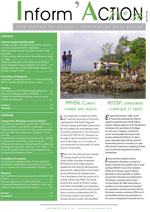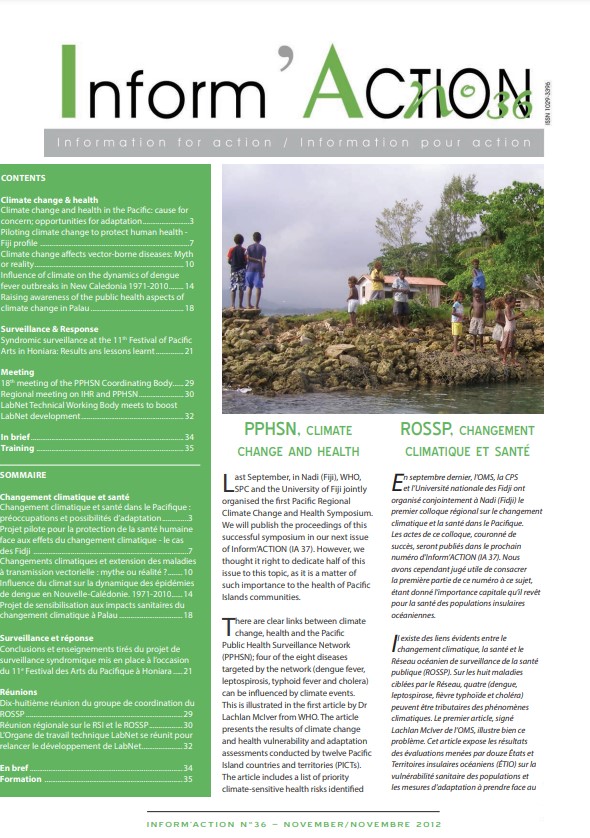Contents
Climate Change & Health
- Climate change and health in the Pacific: cause for concern; opportunities for adaptation
Lachlan McIver [458 KB] - Piloting climate change to protect human health – Fiji profile
Sheetal Singh [257 KB] - Climate change affects vector-borne diseases: Myth or reality
Éric D’Ortenzio and Laurent Guillaumot [221 KB] - Influence of climate on the dynamics of dengue fever outbreaks in New Caledonia
Élodie Descloux [480 KB] - Raising awareness of the public health aspects of climate change in Palau [308 KB]
Surveillance & Response
- Syndromic surveillance at the 11th Festival of Pacific Arts in Honiara: Results and lessons learnt
Salanieta Saketa and SPC’s Public Health Division Team [837 KB]
Meetings
- 18th Meeting of the Pacific Public Health Surveillance Network Coordinating Body [135 KB]
- Regional Meeting on International Health Regulations and PPHSN [171 KB]
- LabNet Technical Working Body meets to boost LabNet development [245 KB]
Training
- Building Pacific operational research capacity in health [221 KB]
In Brief
- New SPC staff [199 KB]
Editorial
PPHSN, Climate change and health
 Last September, in Nadi (Fiji), WHO, SPC and the University of Fiji jointly organised the first Pacific Regional Climate Change and Health Symposium. We will publish the proceedings of this successful symposium in our next issue of Inform’ACTION
Last September, in Nadi (Fiji), WHO, SPC and the University of Fiji jointly organised the first Pacific Regional Climate Change and Health Symposium. We will publish the proceedings of this successful symposium in our next issue of Inform’ACTION
(IA 37). However, we thought it right to dedicate half of this issue to this topic, as it is a matter of such importance to the health of Pacific Islands communities.
There are clear links between climate change, health and the Pacific Public Health Surveillance Network (PPHSN); four of the eight diseases targeted by the network (dengue fever, leptospirosis, typhoid fever and cholera) can be influenced by climate events. This is illustrated in the first article by Dr Lachlan McIver from WHO. The article presents the results of climate change and health vulnerability and adaptation assessments conducted by twelve Pacific Island countries and territories (PICTs). The article includes a list of priority climate-sensitive health risks identified for each country and information on adaptation activities initiated or planned by these countries. For example, Fiji is involved in a seven-country global project entitled Piloting Climate Change Adaptation to Protect Human Health, described by Sheetal Singh from the Fiji Ministry of Health.
Vector-borne diseases (e.g. dengue fever) are often listed as climate-sensitive health risks. Dr Eric D’Ortenzio and Laurent Guillaumot from the Pasteur Institute of New Caledonia describe their point of view in their article Climate change affects vector-borne diseases: Myth or reality? Another article, this one by Dr Elodie Descloux, describes a study conducted in New Caledonia by several experts and researchers who analysed the influence of climate on the dynamics of dengue fever in New Caledonia from 1971 to 2010 and developed models to understand and anticipate risks. The last article related to climate change and health briefly describes a project implemented in Palau in 2011 by several partners to help raise awareness of the public health aspects of climate change.
These articles demonstrate the growing interest that countries and development partners are taking in climate change and health in the Pacific region, and the consequent need to coordinate the activities at regional level. Participants at the recent symposium on climate change and health discussed this with SPC and WHO representatives and proposed that coordination of these activities comes under the PPHSN framework. This will be tabled at the PPHSN Coordinating Body meeting in 2013.
The second half of the bulletin starts with an article by Dr Salanieta Saketa and SPC’s Public Health Division Team, describing an innovative web-based syndromic surveillance system for population gatherings that was successfully piloted in Solomon Islands at the 11th Festival of Pacific Arts. Drawing from this positive experience, SPC plans to complete a comprehensive package of tools for public health surveillance and population gatherings that can be used by PICTs for such events in the future, as an additional service of PPHSN.
The Meetings column of this issue includes information on three meetings involving PPHSN members and services: (i) a regional meeting on international health regulations, the Pacific syndromic surveillance system, the Asia Pacific Strategy for Emerging Diseases (APSED) and PPHSN, which was co-organised by WHO and SPC back to back with (ii) the 18th Meeting of the PPHSN Coordinating Body in May–June, and (iii) the 5th Meeting of the LabNet Technical Working Body that took place at the end of June.
A brief communication on the first module of a Pacific Operational Research course held in Fiji at the beginning of September is included in our Training section, and in the In Brief section we present three new colleagues, Dr Adam Roth, Dr Damian Hoy and Boris Colas, who recently joined SPC’s Public Health Division.
Christelle Lepers
Surveillance Information and Communication Officer, SPC

